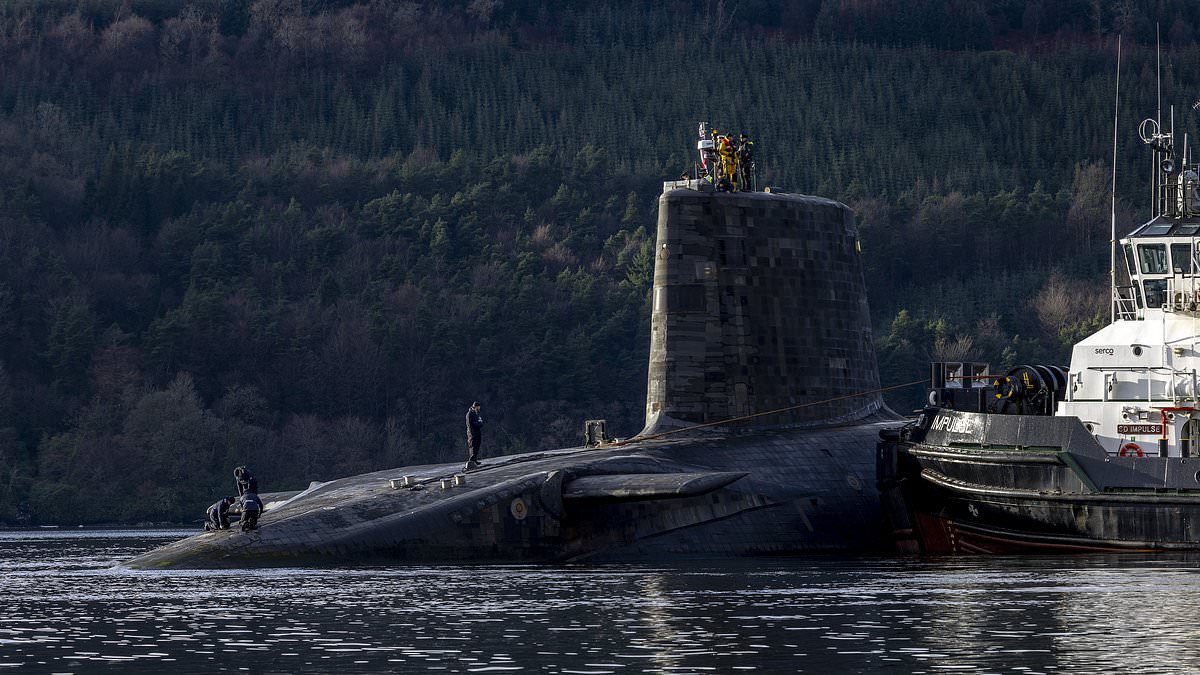Britain’s submarine fleet is ‘beyond its sell-by date’, former Chief of Defence admits, in damning verdict on state of country’s nuclear deterrent
By Editor,Mark Nicol
Copyright dailymail

The former head of the UK’s armed forces has condemned the state of submarines carrying Britain’s nuclear deterrent.
Admiral Sir Tony Radakin decried the Royal Navy’s decrepit subsurface fleet at a time when the world is getting more dangerous and unstable.
He stepped down just weeks ago after three years as Chief of the Defence Staff (CDS). In his first speech he attacked governments for leaving Britain exposed.
Admiral Sir Tony told the Institute for Government: ‘The world is getting more dangerous and our armed forces are not as strong as we would wish.
‘There is something wrong when successive governments profess the nuclear continuously at sea deterrent is our highest priority but our sailors are having to put to sea for extraordinarily long patrols in some of the most complex machines on the planet that are beyond their original design life.’
Shortages of serviceable submarines has forced the Royal Navy to extend the patrols of ‘bomber’ submarines which carry Britain’s nuclear weapons.
The longest patrol by a British ‘bomber’ is thought to have been the 204-day deployment in 2025 by a Vanguard-class Royal Navy submarine.
This beat the previous record of 201 days set by another submarine from the same class the previous year.
These submarines spent so long lurking at the bottom of the ocean their hulls were seen covered in slime and barnacles when they returned to port.
The physical strain on the Vanguard class submarines is mirrored by the psychological effects on their crews of spending six months and longer at sea.
Each submarine has a crew of around 130 sailors and officers
Experts have also warned of the growing risk of a catastrophic accident as parts are being cannabalised from other submarines which are more than 30 years old.
While many senior commanders are known for only raising issues once they have left retired, Sir Tony insisted he pressed governments repeatedly about the submarines.
The shortage of submarines is also compounded by the length of time it takes to conduct repairs.
The UK has four Vanguard submarines that are long past their retirement. They were designed to last 25 years but have been in service for nearly 40 years.
Admiral Sir Tony also warned the Institute for Government of the dangers of nuclear proliferation and a lack of arms controls.
He highlighted the absence of any nuclear pacts between the world’s largest military superpowers, the United States and China.
He said: ‘Most people my age grew up expecting nuclear proliferation. That never really happened. This third nuclear age includes an increasing presence of nuclear weapons in the policies and doctrines of our adversaries. That means the need for a continuous dialogue remains true today.
‘Long standing agreements have fallen apart because of Russian violations. In some regions of the world such arrangements have never existed. The absence of agreements between China and the US is a glaring gap in our global security architecture. There are more states with more nuclear weapons. We need to step up our approach to arms control, especially nuclear.’
Admiral Sir Tony also cited that thousands of North Koreans are fighting in Europe, Iran and Israel are attacking each other and the Houthi are attacking international shipping.
But he argued there was also pluses, such as Ukraine’s defiance, the expansion and strengthening of NATO and Europe’s Coalition of the Willing led by the UK and France.
He said Britain was ‘safe for now’, due to its nuclear deterrent, its membership of NATO and because its closest ally was ‘a superpower called America’.



